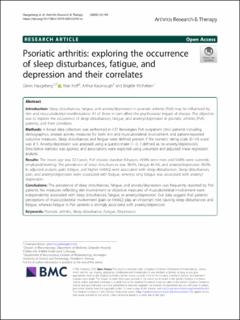| dc.description.abstract | Introduction: Sleep disturbances, fatigue, and anxiety/depression in psoriatic arthritis (PsA) may be influenced by skin and musculoskeletal manifestations. All of these in turn affect the psychosocial impact of disease. The objective was to explore the occurrence of sleep disturbances, fatigue, and anxiety/depression in psoriatic arthritis (PsA) patients, and their correlates. Methods: A broad data collection was performed in 137 Norwegian PsA outpatient clinic patients including demographics, disease activity measures for both skin and musculoskeletal involvement, and patient-reported outcome measures. Sleep disturbances and fatigue were defined present if the numeric rating scale (0–10) score was ≥ 5. Anxiety/depression was assessed using a questionnaire (1–3; 1 defined as no anxiety/depression). Descriptive statistics was applied, and associations were explored using univariate and adjusted linear regression analysis. Results: The mean age was 52.3 years, PsA disease duration 8.8 years; 49.6% were men and 54.8% were currently employed/working. The prevalence of sleep disturbances was 38.0%, fatigue 44.5%, and anxiety/depression 38.0%. In adjusted analysis, pain, fatigue, and higher mHAQ were associated with sleep disturbances. Sleep disturbances, pain, and anxiety/depression were associated with fatigue, whereas only fatigue was associated with anxiety/depression. Conclusions: The prevalence of sleep disturbances, fatigue, and anxiety/depression was frequently reported by PsA patients. No measures reflecting skin involvement or objective measures of musculoskeletal involvement were independently associated with sleep disturbances, fatigue, or anxiety/depression. Our data suggest that patients’ perceptions of musculoskeletal involvement (pain or mHAQ) play an important role causing sleep disturbances and fatigue, whereas fatigue in PsA patients is strongly associated with anxiety/depression. | en_US |

